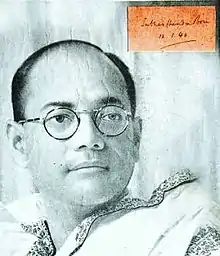Special Bureau for India
Sonderreferat Indien,[1][2][3] variously translated into English as, Special Bureau for India,[2] Special India Bureau,[4] or Section for Indian Affairs,[1] was a section or bureau established within the Information Department of the Foreign Office of Nazi Germany in late spring 1941 in response to a proposal or memorandum written by the Indian nationalist Subhas Chandra Bose, who had arrived in Germany in early April of that year.[3] The main function of the bureau was to aid Bose in his work,[1] to liaise with Bose,[2] and to mobilize an Indian Legion, comprising Indian POWs captured by Erwin Rommel's Afrika Korps, to aid the German military in a future land invasion of India.[1] A military intervention in India, one of the two major points in Bose's proposal, had at first received a lukewarm response from the German Foreign Minister Joachim von Ribbentrop, but shortly afterwards it received the unexpected support of Adolf Hitler, who saw the battle for India as the natural aftermath of a successful German invasion of Russia and a chance to deliver the ultimate blow to the British Empire.[5]

Wilhelm Keppler, then an under-secretary of State in the German Foreign Office, who had direct access to Ribbentrop, was appointed director of the bureau.[2] Most of the day-to-day work, however, became the responsibility of Adam von Trott zu Solz, an anti-Nazi official, who had some knowledge of India.[2] Immediately under von Trott was his longtime friend Alexander Werth, who earlier had been imprisoned by the Nazis for a few years.[2] The remaining staff in the bureau included F. J. Furtwaengler, A. F. Richter, H. T. Leipoldt, Prof Dr Alsdorf (an Indologist, who, during his tenure at the bureau, published Deutsch-Indische Geistesbeziehungen (German-Indian Intellectual Connections) (1942) and Indien und Ceylon (1943)[6]), Mrs Kruse, Dr. Kretschmer, Baron von Zitzewitz, Baron von Lewinski, Mr Assmann, and Mr Trump.[2] Bose was required to be addressed as "His Excellency" by order of the senior officials in the Foreign Office.[7]
In time, the bureau became a refuge for anti-Nazis, especially von Trott himself, who used his position as a cover for his "clandestine activities abroad."[8][2] Von Trott travelled to "Switzerland, Turkey, Scandinavia and throughout Nazi-occupied Europe" ostensibly on Special Bureau business, but in actuality attempting to reach out to German military officers opposing Nazi policies, and in the process risking his life.[9] Von Trott would be executed by the Nazis in 1944. Bose was probably not aware of von Trott's anti-Nazi work,[9] in part because Bose and von Trott did not develop a personal friendship or mutual trust,[9] though some later scholars attempted to portray Bose as an anti-Nazi by suggesting a friendship.[10] According to the historian Leonard A. Gordon, von Trott, "... feeling that Bose did not understand the Nazi tyranny and how it was destroying what was best in the German tradition, ... withheld his deeper sympathy and intimate friendship from Bose."[9]
Notes
- Klemperer 1994, p. 275.
- Gordon 1990, p. 445.
- Kuhlmann 2003, p. 158.
- Hayes 2011, p. 57.
- Hayes 2011, pp. 38–39.
- McGetchin 2009, p. 179.
- Klemperer 1994, p. 276.
- Klemperer 1994, pp. 275–276.
- Gordon 1990, p. 446.
- Hayes 2011, p. 210.
References
- Buschak, Willy (2010), Franz Josef Furtwängler: Gewerkschafter, Indienreisender, Widerstandskämpfer : eine politische Biografie, Klartext Verlagsges. Mbh, ISBN 978-3-8375-0387-6
- Gordon, Leonard A. (1990), Brothers against the Raj: a biography of Indian nationalists Sarat and Subhas Chandra Bose, Columbia University Press, ISBN 978-0-231-07442-1
- Hayes, Romain (2011), Subhas Chandra Bose in Nazi Germany: Politics, Intelligence and Propaganda 1941-1943, Oxford University Press, ISBN 978-0-19-932739-3
- Klemperer, Klemens von (1994), German Resistance Against Hitler: The Search for Allies Abroad 1938-1945, Oxford University Press, ISBN 978-0-19-151334-3
- Kuhlmann, Jan (2003), Subhas Chandra Bose und die Indienpolitik der Achsenmächte, Berlin; Tübingen: Verlag Hans Schiler, ISBN 978-3-89930-064-2
- McGetchin, Douglas T. (2009), Indology, Indomania, and Orientalism: Ancient India's Rebirth in Modern Germany, Fairleigh Dickinson Univ Press, ISBN 978-0-8386-4208-5
- Werth, Alexander (1971), Der Tiger Indiens: Subhas Chandra Bose ; ein Leben für die Freiheit des Subkontinents, München: Bechtle-Verlag, ISBN 978-3-7628-0150-4
